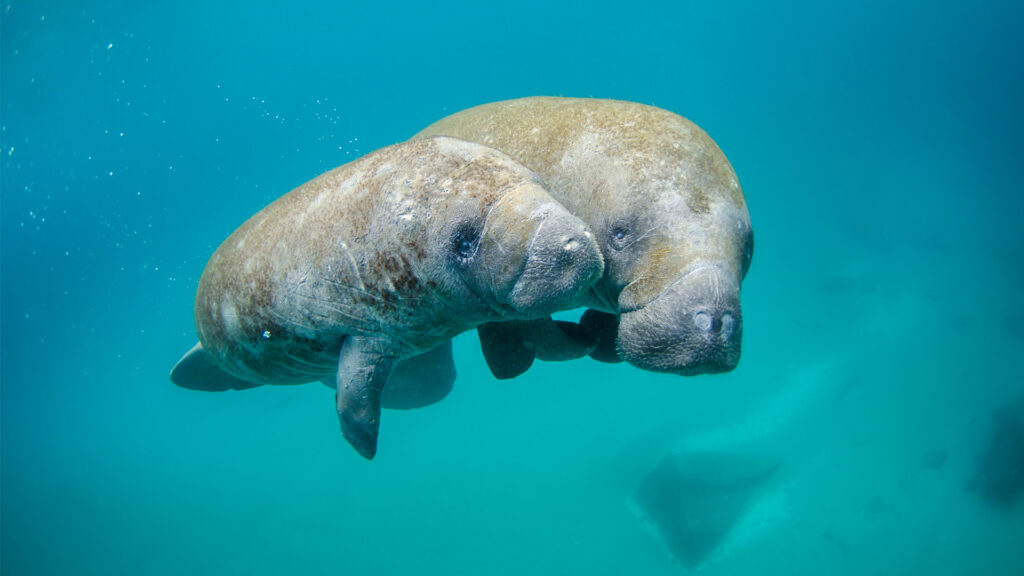By Jon Paul “J.P.’’ Brooker, Ocean Conservancy
For manatees, there’s no room for politics in their fight for survival.
But sadly, they have been used as a political football for decades, including when they were delisted as an endangered species in 2017.

The Endangered Species Act is an important federal law aimed at helping bring imperiled animals back from the brink of extinction. And we absolutely, unequivocally need manatees to be listed as endangered.
It was preposterous that they were delisted in the first place. That decision was politically motivated, and it was made during a deeply partisan time in our history. Partisan politics and narrow-sighted gains in a perceived battle against a nanny state won out over manatee protections.
The reality is that manatee protections, and marine and ocean conservation issues in Florida in general, are not at all political. True Floridians, regardless of political affiliation, love manatees and want to make sure they are around forever. And now, thanks to the tireless efforts of conservation groups, the U.S. Fish and Wildlife Service is embarking on a year-long consideration of whether to once again designate the manatee as endangered.
Yes, we must relist the manatee as endangered and should use the Endangered Species Act to designate critical habitat for the manatee. But let’s not take our eyes off what is truly hurting manatees in Florida: widespread water quality degradation.
Over the past two years, we’ve lost 26% of Florida’s manatee population. They are starving to death because the seagrass they eat is being killed by harmful algal blooms and poor water quality. Poor water quality is being driven by humans pumping too much waste into our coastal watersheds stemming from municipal, residential, commercial and agricultural sources. There is fault to go around, and there are fixes that are needed from everyone.
And yet, politics come into play again and again. The blame game persists, and political committees and dark money confound voters with endless finger-pointing. Big Sugar says the source of waste and pollution is residential septic systems, municipalities blame phosphate miners, rural interests point to city wastewater facilities, and on and on.

The reality is everyone is at fault, and we need to transcend the politics of culpability that have brought manatees to the brink. That’s why we need an unprecedented, massive effort toward comprehensive water quality reform.
We need to enhance and enforce Basin Management Action Plans across the state, not just in a handful of watersheds. We need to conduct broad scale scientific analyses in critical watersheds like the Indian River Lagoon and Tampa Bay to determine where nutrients like nitrogen and phosphorus are coming from. We need enhancements to Best Management Practices for agricultural producers that simultaneously suit their needs and reduce upstream nutrient loading. We need to bring back the concept of growth management in Florida, and we need to insist new developments have no-net-increase in nutrient pollution for our waterways. We need investments in septic-to-sewer conversions, advanced wastewater and stormwater treatment, and other new technology that will reduce nutrient loading.
While the federal government is taking a step in the right direction by considering manatees for relisting as endangered, I strongly encourage Floridians to focus on the greater battle for Florida water quality. Do not get wrapped around the political axle when it comes to standing for clean Florida water. Floridia Republicans, Democrats and independents alike all need to be strong advocates in a nonpartisan fight for clean water.
Jon Paul “J.P.” Brooker is the Florida director and an attorney for Ocean Conservancy. He is a native Floridian based in St. Petersburg.
If you are interested in submitting an opinion piece to The Invading Sea, email Editor Nathan Crabbe at ncrabbe@fau.edu. Sign up for The Invading Sea newsletter by visiting here.




Yes! All of the above! We have lost so many resources by our inaction for more than a decade on nutrient inputs; so, it will be a heavy, but necessary, lift.